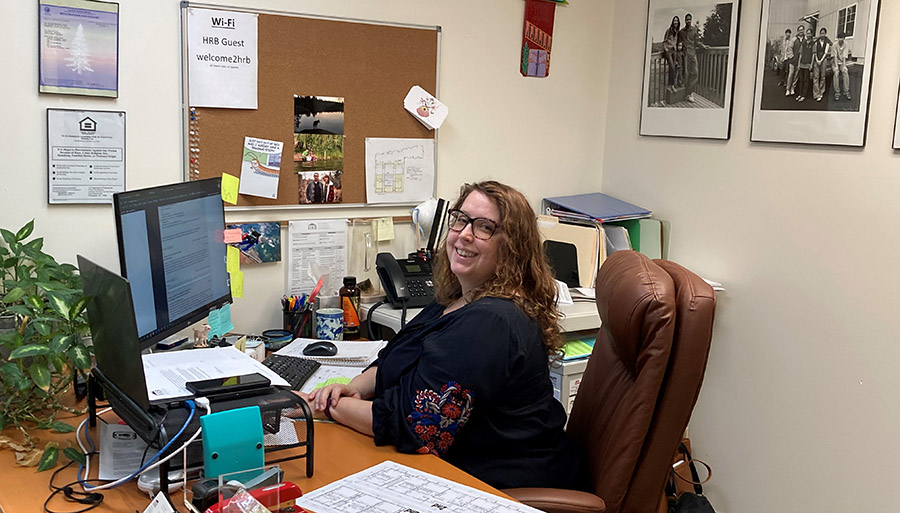HRB’s Property and Office Manager Jessica Campbell talks about empathy and how good it feels to say, “Welcome home,” when just about no one else could.
Navigating the world of affordable housing can be tortuous. If you are homeless or at risk of being so, it can be terrifying. Vacancies are scarce; regulations are highly technical; and the waitlists at most affordable housing providers in Kitsap County are two years long. For HRB’s Property and Office Manager Jessica Campbell, it can be hard to deliver these truths. “This is the first job I’ve ever had where I don’t have the immediate fix for people,” she says. But if she can’t change the facts, then she can at least deliver them with compassion. And she can temper the almost inevitable distress with hope and education.
Jes fields about 15 calls a week from people looking for an affordable place to live. About half have a history of living in poverty. The other half are facing it for the first time, perhaps after a tragedy or medical emergency, and they do not know what to do.
Jes gives every caller a patient overview of HRB housing programs and waitlist policies (there are no vacancies), as well as an orientation to the affordable housing landscape more generally. She also steers her clients toward new resources and strategies, perhaps providing a county-wide list of landlords offering affordable rent or letting them know they can accept a unit off Island if one becomes available before an HRB unit does and still retain their place on the HRB waitlist. “I think that self-determination is powerful in any environment. I want people to go forward knowing what to expect and being able to make informed decisions about next steps.”
 In a world of harried bureaucrats and overwhelming need, this kind of counsel isn’t always possible. But Jes refrains from finding fault with her peers in the field. “We have limited time, and we have limited resources. And we’ve heard it all before. As empathetic people, we have to protect ourselves from all of the pain. And there are days when people resort to, ‘Here’s your paper. Next.’ I like to think I have a good balance.”
In a world of harried bureaucrats and overwhelming need, this kind of counsel isn’t always possible. But Jes refrains from finding fault with her peers in the field. “We have limited time, and we have limited resources. And we’ve heard it all before. As empathetic people, we have to protect ourselves from all of the pain. And there are days when people resort to, ‘Here’s your paper. Next.’ I like to think I have a good balance.”
Rather than deflecting her clients’ emotion with armor—or paper—Jes steels herself with “moments of sunshine” like this favorite. “I’m in the unit with them,” she says, setting the scene. “We’ve completed their move-in inspection, I hand them their keys, and I say, ‘Welcome home.’”
Seated opposite the front door, Jes is the first person people see when they visit HRB. She keeps two chairs opposite her desk, a rug, and orchids on the windowsill beside the framed copies of federal fair housing laws, carving out a living room in the more institutional office setting. Her colleagues have seen any number of people seated before her in varying states of mind. Inevitably, some are distressed or aggrieved. But most are simply engaged in what they are learning about income qualifications, unit sizes, and background checks.
Still others, having dropped by to deliver a rent check, end up in one of those chairs because they have good news to share. Jes works for balance in her relationships with tenants, showing genuine compassion and interest in their lives while remaining professional and upholding protocols. Nevertheless, she recently rejoiced when she heard that a tenant’s child had graduated high school, after hearing of his struggles over the years. And there have been many reports of new jobs, something they would not have been able to find without the safe, stable, and well-maintained housing they enjoy at HRB. “When you don’t have a working stove, or there’s mold, or it’s scary to be outside,” Jes says, “it’s harder to make those personal steps forward, because you’re so stuck in that place of distress.”
Prior to HRB, Jes worked for the Dispute Resolution Center for 10 years, where she was a certified mediator, an intake specialist, and a behavioral health ombudsman. Here she found herself immersed in difficult stories and demanding circumstances, perhaps helping a parent come to terms with the needs of an adult child newly diagnosed with bipolar disorder or helping a divorced couple with a history of domestic violence agree on a parenting plan.
But with a job as emotional as hers, she finds herself drawing from personal experience too. Jes grew up in a very poor family. “I was the person who lived in that neighborhood over there, one of those people. And I was the person who was handed the piece of paper, without explanation or the opportunity to take a second and ask a question because I didn’t understand. I really try hard to remember that place of frustration when navigating poverty and really make the time to help support people from a place of real presence and not rote routine.”
“Bainbridge is an amazing place,” she continues. “There are so many things that Bainbridge gets right. There are these beautiful parks, highly rated schools, and clean shopping plazas. And there are arts and recreation. Every person in the community contributes to that. Our tenants contribute to that. We have restaurant workers and grocery workers; we have health care workers and social service providers; we have artists, volunteers, and grandparents. I love that our tenants are not ‘those people over there in that neighborhood.’ They are our neighbors. And I’d like to see that grow.”
